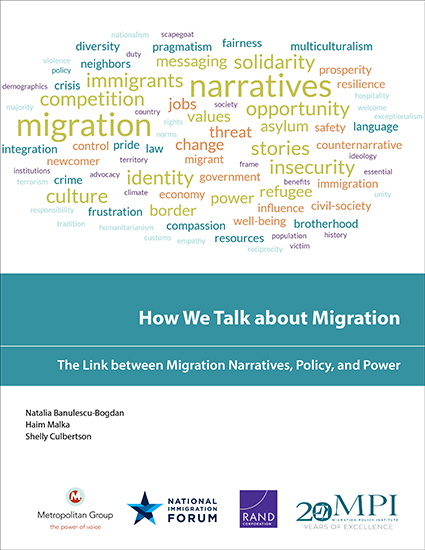
Migration Narratives, Policy and Power

How We Talk About Migration
The Link Between Migration Narratives, Policy and Power
Narratives are more than just words—they shape the way we see what surrounds us and what we think, believe and do. How policymakers, community leaders and members of the public see and talk about migration is, thus, intimately connected to the design and implementation of policies that affect not just newcomers, but the health of communities and countries as a whole.
We are at a historic point in the debate over migration. While the COVID-19 pandemic slowed migration flows over the last year, the confluence of conflict, corruption, economic woes and climate change in many parts of the world continues to drive people from their homes in search of better opportunities and security. This means that the need for rational debate on migration policy has rarely been greater, not only in the United States, but around the world.
Metropolitan Group, the Migration Policy Institute, the RAND Corporation and National Immigration Forum have published a report titled How We Talk About Migration: The Link Between Migration Narratives, Policy and Power. The report researched prominent migration narratives in five case-study countries: Colombia, Lebanon, Morocco, Sweden and the United States. The research mapped salient narratives, identified differences and analyzed similarities in migration narratives in very different political and cultural contexts.
Our research found that the most dominant threat narratives across all five countries are driven by insecurity. Moreover, we found that migration narratives are manipulated and in some cases weaponized to advance a wide range of policy objectives that undermine democratic values. Yet, there is a significant gap in positive and effective narratives that can counter harmful and weaponized ones.
The report is part of a multiphased project we launched in 2020 examining migration narratives, including why different ones resonate and under what conditions they shift. The project aims to inform policymaking as well as public discourse and communication about migration, in the process opening space for reasoned discourse and more humanizing policies. Our next phase of work seeks to address this gap in resilient positive narratives, and create effective and practical tools for policymakers, advocates, academics and NGOs concerned with fostering more humanizing migration policies.
Metropolitan Group, the Migration Policy Institute, the RAND Corporation and National Immigration Forum developed this resource in partnership. It is also available on MPI’s website, linked here.